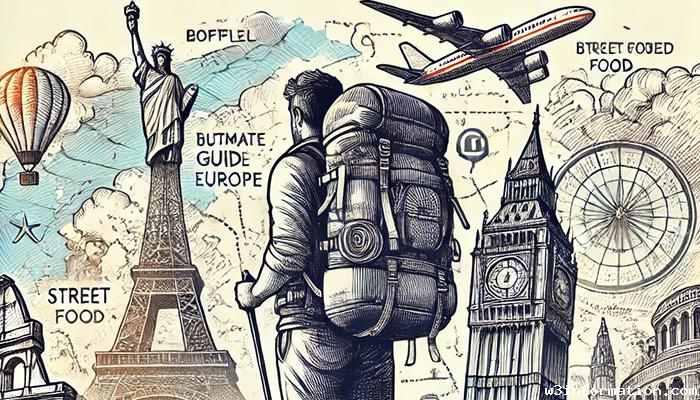The Ultimate Guide to Backpacking in Europe
Traveling across Europe by backpacking provides an unforgettable adventure. Europe provides unlimited exploration possibilities for budget travelers through its cultural diversity and historical richness along with beautiful landscapes. This guide offers crucial tips and essential information to help both new travelers and experienced wanderers fully enjoy their backpacking experience across Europe. This guide covers all necessary details including route planning and budget-friendly accommodations for an unforgettable European backpacking experience.
Planning Your Backpacking Route
Before starting your European backpacking adventure you should begin by planning your travel route. Since Europe covers a wide range of landscapes and cultures it is essential to identify your personal interests before you start exploring. Europe features historical landmarks as well as stunning natural beauty alongside vibrant urban environments and hidden treasures.
a. Popular Backpacking Routes
Western Europe: First-time backpackers will find this travel path connects France, Spain, Portugal, Belgium, and the Netherlands. Europe offers the opportunity to explore renowned cities like Paris, Barcelona, and Amsterdam as well as the stunning landscapes found in the French countryside and along the Spanish coast.
Eastern Europe: Those seeking a less conventional travel experience should explore Eastern Europe. The cities of Prague, Budapest, Kraków, and Bucharest promise travelers rich historical backgrounds along with affordable prices and distinctive cultural experiences. The region features breathtaking natural sights that include the Carpathian Mountains and the charming Adriatic coastline.
Scandinavia: Nature enthusiasts who desire adventure should think about backpacking across the Nordic countries including Norway, Sweden and Finland. This region offers perfectly for hiking enthusiasts and those who want to explore nature and experience the midnight sun while enjoying both fjords and northern lights.
The Balkans: Visitors to the Balkan Peninsula find a combination of historical and cultural sites alongside beautiful landscapes at low prices. Explore Croatia’s Dalmatian coast as well as Montenegro's mountainous regions and the historical landmarks found throughout Serbia, Bosnia, and Albania.

b. Budgeting Your Time
Determine the number of days you plan to spend in each destination while maintaining flexibility in your itinerary. When you go backpacking you will often encounter unexpected adventures which makes flexibility an essential part of your travel plan. Use trains and buses for city travel and investigate tourist discount travel passes like the Eurail Pass.
Packing Essentials for Backpacking in Europe
It is essential to pack light when you go backpacking through Europe. Since you will carry all your belongings on your back while backpacking you must pack only essential items. Here's what you need to bring:
a. Backpack
A successful backpacking trip relies on having a backpack that provides comfort, durability, and the correct size. A backpack with a 40-60 liter capacity is the best choice when planning for extended travel periods. Choose a backpack with adjustable straps and padded shoulder and waist belts that contain compartments which allow quick access to your equipment.
b. Clothing
Choose garments that are adaptable for different settings while being lightweight and suitable for layering. Visiting different countries in Europe requires checking seasonal weather forecasts to pack appropriate clothing.
Comfortable Shoes: Exploring both cities and countryside requires a good pair of walking shoes or hiking boots.
Weather Gear: For unpredictable weather conditions a light rain jacket combined with a warm sweater and a hat proves useful.
Versatile Clothes: Select clothing items that work well together for multiple outfits. Bring along one or two sets of nice evening-outfits and pack quick-drying pants and tops.
Sleepwear: Ensure you pack comfortable sleepwear because you will need it for your stays at hostels or budget accommodations.
C.Travel Accessories
Travel Guidebook and Maps: Smartphones serve useful purposes yet a guidebook proves invaluable for offline navigation while offering essential travel advice.
Power Bank: Use a portable power bank to maintain your devices' charge throughout extended travel days.
Water Bottle: Maintain proper hydration when you explore urban areas and natural landscapes.
First-Aid Kit: Include band-aids, pain relievers and your personal medications in your basic first-aid kit essentials.
Important Documents
Passport and Visa: Your passport should remain valid throughout your entire trip. Verify whether you need a Schengen visa and any additional travel documents.
Travel Insurance: Ensure to keep travel insurance that protects against health emergencies as well as accidents and lost or stolen items.
Credit Cards and Cash: Bring both cash and cards since certain locations might not take card payments. Always notify your bank about your international travel dates to prevent transaction problems abroad.
How to budget and save money throughout your backpacking journey
Travelers can explore Europe on a budget by planning their backpacking trips carefully. Follow these money-saving tips while exploring new places:
a. Accommodation
Hostels: Hostels represent the cheapest accommodation choice for backpackers because they have both dormitory-style rooms and private rooms. Many hostels serve free breakfast to their guests and provide social spaces to help travelers meet each other.
Couchsurfing: Through Couchsurfing platforms you can stay with local hosts without paying fees as they provide accommodation in exchange for cultural exchange or friendly conversation.
Airbnb: You can book economical rooms or full apartments on Airbnb for better privacy during group travel.
b. Transport
Eurail Pass: The Eurail Pass provides significant savings on train fares throughout multiple countries for those who intend to travel extensively by rail.
Budget Airlines: Budget airlines like Ryanair and EasyJet provide cheap flights across Europe's major cities.
Buses: Bus travel offers a cost-effective solution for covering long distances. FlixBus and Eurolines provide affordable travel options across Europe.
Walking and Biking: Walking stands out as the optimal method to get to know cities while costing nothing. Numerous cities provide affordable bike rental programs where you can rent bicycles for daily use or extended periods.
c. Food
Street Food: Trying local street food delivers both an enjoyable flavor experience and savings on your wallet. Visit local markets and check out food stalls that sell fresh, regional specialties.
Supermarkets: You can save money on your travels by purchasing groceries and cooking your own meals which works well with hostel kitchen access.
Budget Restaurants: Smaller local eateries offer authentic meals at much lower prices than touristy restaurants.
Essential Tips for Backpacking in Europe
a. Stay Flexible
Backpacking requires planning yet thrives on spontaneous adventures. Consider adjusting your travel itinerary when you discover an intriguing location or connect with new individuals and stumble upon hidden treasures. Being flexible during your travels will improve your experience and create opportunities for unexpected adventures.
b. Travel Slowly
The desire to visit numerous places can lead travelers to move too fast which often results in a stressful journey that reduces overall enjoyment. Make sure to thoroughly explore every city and region during your travels. Make sure to dedicate several days in every location so you can experience the local culture firsthand.
c. Learn Basic Phrases in Local Languages
Even though English is commonly used around the world, knowing basic phrases in the local language can greatly improve your experience. The basic expressions “hello,” “thank you,” and “please” help you establish connections with locals and enrich your travel experience.
d. Safety and Awareness
Protect your personal items with vigilance during visits to crowded tourist destinations. Important documents should be stored in a money belt while large sums of cash should be avoided. Maintain vigilance when traversing unknown areas and listen to your inner feelings.
Must-See Destinations for Backpackers
All regions of Europe offer distinct attractions but we present essential travel spots for backpackers.
Paris, France: Make the iconic Eiffel Tower your first stop before visiting the Louvre and then relax in the city’s charming streets and cafes.
Amsterdam, Netherlands: Explore Amsterdam’s charming streets by renting a bike and touring its beautiful canals while visiting top-tier museums and experiencing the city’s relaxed atmosphere.
Prague, Czech Republic: This city offers affordable stays alongside medieval structures and historical significance while boasting an active nightlife.
Budapest, Hungary: Budapest combines thermal baths and grand architecture with vibrant culture to offer a perfect setting for backpacking adventures.
Barcelona, Spain: Beaches alongside Antoni Gaudí's distinctive architecture and Las Ramblas' vibrant ambiance make Barcelona a captivating destination.
Dubrovnik, Croatia: The coastal city of Dubrovnik offers breathtaking views alongside historic landmarks and tranquil surroundings.
Conclusion: European backpacking provides an exhilarating journey that brings endless chances for adventure while supporting personal development and self-discovery. You can create an unforgettable journey by planning your route along with smart packing strategies and staying within budget while keeping an open mind for new experiences. The cultural richness and historical depth of Europe combined with its stunning landscapes ensure that every part of your backpacking journey will be valuable. Begin your journey by packing your essentials and welcome the travel freedom as you prepare for a lifetime adventure.
 Why Emotional Intelligence Should Be Taught in Schools
Why Emotional Intelligence Should Be Taught in Schools
 The Future of Higher Education: Trends to Watch
The Future of Higher Education: Trends to Watch
 How to Create an Effective Learning Environment at Home
How to Create an Effective Learning Environment at Home
 Top 10 Study Tips for Students
Top 10 Study Tips for Students
 How Online Learning is Changing the Education Landscape
How Online Learning is Changing the Education Landscape
 How to create backend CRM using React JS
How to create backend CRM using React JS